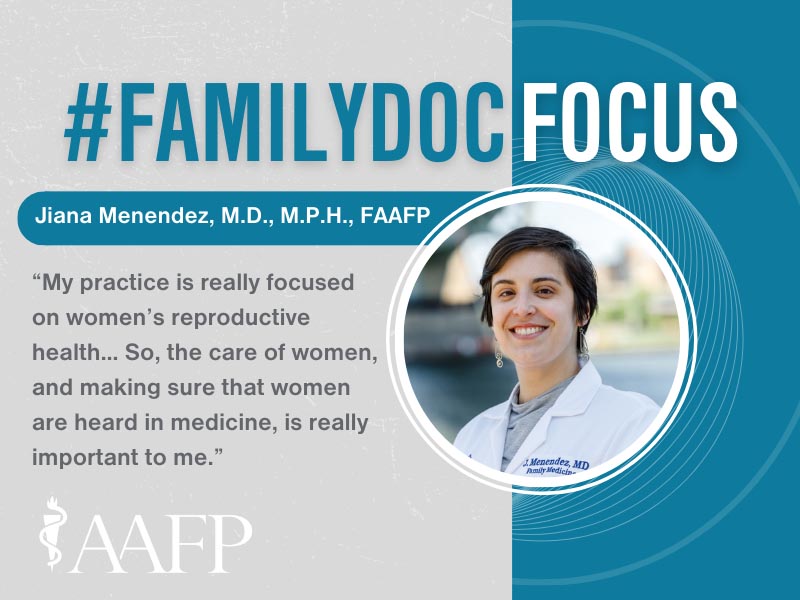NCCL Leader Following in Residency
Mentor’s Footsteps
Sept. 12, 2024, David Mitchell — It all started with an email.

Jiana Menendez, M.D., M.P.H., FAAFP, entered the Icahn School of Medicine at Mount Sinai in New York with an interest in sexual health, but a clinical rotation early in her third year left her feeling like she was on the wrong path.
“I spent hours in an OR watching a myomectomy during my OB rotation thinking, ‘This is not what I thought OB was going to be,’” said Menendez, who taught sex education to middle and high school students prior to med school. “’I’ve got to figure out how to do sexual health in a way that’s … not this.’ I wanted something that was more about primary care, sexual and reproductive health and not a surgical specialty.”
Menendez’s medical school advisor gave her a list of potential contacts arranged by specialty. There were a few physicians listed in the family medicine section, including Linda Prine, M.D., with a note next to her name that simply said, “reproductive health.”
“I thought, ‘That’s interesting,” Menendez said.
Menendez emailed Prine, a member of the Mount Sinai residency faculty who practiced at the Institute for Family Health, hoping for information about family medicine. Instead, she got an invitation to lunch.
“She told me about her career and how she integrated reproductive health into family medicine,” Menendez said. “It really made a big impression on me. I ended up training with her my whole career. I went to her residency program (Mount Sinai Downtown Residency in Urban Family Medicine), and I did the fellowship that she developed, the Reproductive Health Access Project. Now I do primary care but have a real focus on reproductive and sexual health. I managed to carve out exactly what I was looking for in medicine.”
Since June, Menendez has been an attending physician at MaineHealth Primary Care and faculty at MaineHealth Family Medicine Residency in Falmouth; an assistant professor at Tufts University; and clinician at Maine Family Planning.
Before she worked with Prine as a resident and fellow, Menendez took a women’s reproductive health elective with her as a medical student.
“It was a really competitive elective,” she said. “They only took one student a month, and I had to wait more than a year. I managed to get in, and it was wonderful. That one email changed my whole life.”
Prine not only steered Menendez to family medicine and reproductive health, but also taught her how to advocate for her patients and community.
“Linda was really involved in the New York Academy and the AAFP, and she started bringing me to meetings as a first- or second-year resident,” she said. “She would bring a group of residents to the AAFP Congress of Delegates each year and would help us with fundraising and organize a place for us to stay.”
After completing residency in 2019, Menendez stayed in New York as an attending at the Institute for Family Health and assistant professor at the Mount Sinai Downtown Residency until this spring. During those five years, she rose through the ranks of the New York State AFP. After serving as a resident delegate to her state chapter’s congress of delegates, she served as the new physician member of the chapter’s board and later as a director. She also chaired the chapter’s advocacy commission.
She has followed Prine’s example, bringing residents to state chapter meetings and encouraging them to get involved in leadership.
“This past year, two of my residents were on New York State Academy commissions,” said Menendez, who opted for the “slower pace” of Maine along with her husband, an emergency room nurse, this year after the birth of their first child. “I definitely tried to inspire that same level of involvement that Linda inspired in me and so many others. Once I get involved with the Maine Academy, I would love to help get residents involved here.”
Menendez recently completed a two-year term as the AAFP’s Young Physician Section Delegate to the AMA. However, she was elected to two new roles this spring during the Academy’s National Conference of Constituency Leaders, which is a development event for women; members who are Black, Indigenous and people of color; international medical graduates; new physicians; and LGBTQ+ physicians or physicians who support LGBTQ+ issues. Menendez was chosen by her peers as a co-convener of the women’s constituency group and a member constituency alternate delegate to the AAFP Congress of Delegates.
“My practice is really focused on women’s reproductive health,” said Menendez, who completed an advocacy fellowship through the Physicians for Reproductive Health in 2020. “I work in providing contraceptive procedures, abortion care, counseling about options, prenatal care — any type of reproductive health care. So, the care of women, and making sure that women are heard in medicine, is really important to me.”
After serving as a member constituency alternate delegate this year, Menendez will serve as a member constituency delegate at the 2025 Congress of Delegates.
“The newly elected alternate delegates learn from the delegates,” she said. “It’s a cycle of developing leadership, which is really the point of NCCL.”